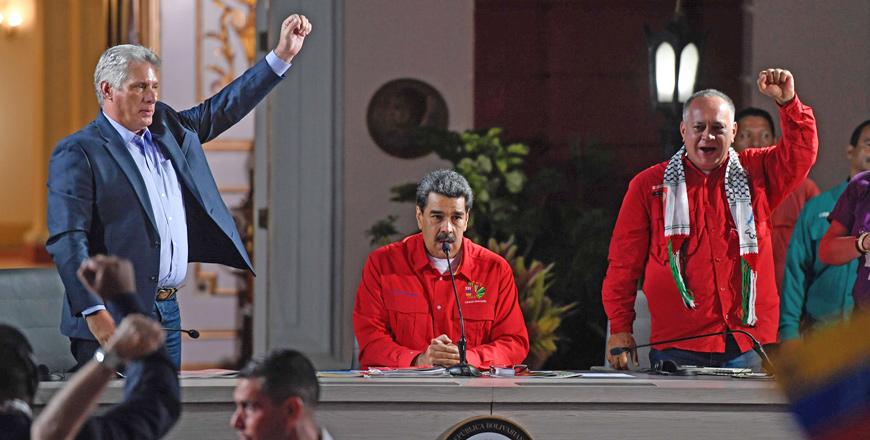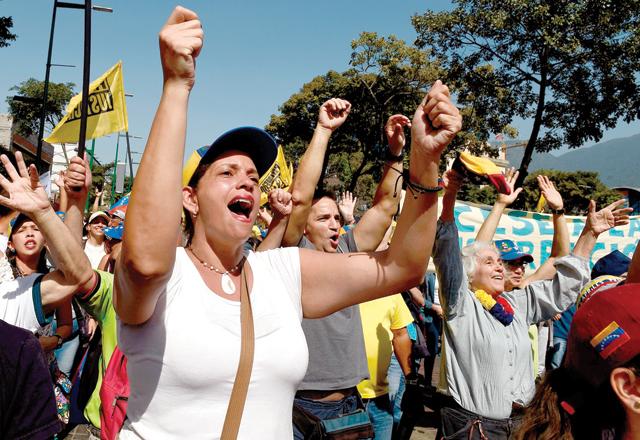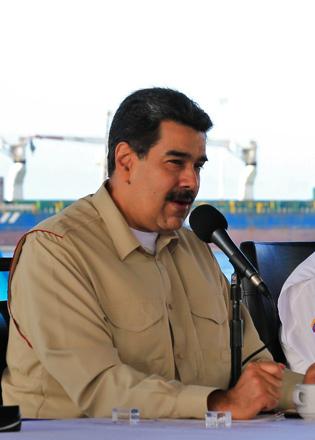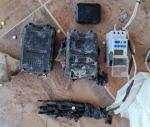You are here
Venezuela’s power struggle drags on
By AFP - Aug 01,2019 - Last updated at Aug 01,2019

Cuban President Miguel Diaz-Canel (left), his Venezuelan counterpart Nicolas Maduro (centre) and the President of the Venezuelan National Constituent Assembly Diosdado Cabello are photographed during the closing ceremony of the the Sao Paulo Forum at Miraflores Presidential Palace in Caracas, on Sunday (AFP photo)
CARACAS — With the pressure from street protests easing, a US intervention unlikely and the military entrenched behind the regime, the power struggle between Venezuela's President Nicolas Maduro and opposition leader Juan Guaido has ground to an impasse.
More than six months after proclaiming himself acting president, and earning the recognition of more than 50 countries, Guaido has not succeeded in ousting Maduro and can no longer attract the massive crowds of supporters that he once mobilised.
Guaido has tried to keep hope alive, encouraging Venezuelans weary after years of crisis not to give up. But on July 23, six months after he launched his bold challenge to unseat Maduro, less than 1,000 people turned up to a special event in downtown Caracas.
His movement has "gone cold — you don't feel an irreversible change is on the way, but amidst this uncertainty, a denouement can come at any time", political scientist Luis Salamanca told AFP.
In the meantime, Venezuela sinks ever deeper into economic meltdown.
The International Monetary Fund says inflation will hit a staggering 1 million per cent this year while the economy — already in recession for five years — will shrink by 35 per cent.
Added to that are the devastating sanctions imposed by the United States — one of Guaido's main backers — which have been ratcheted up in recent months by President Donald Trump, with an oil embargo announced in April and measures targeting Maduro's inner circle.
Starved of foreign currency and cash, Maduro finally accepted aid from the Red Cross in April — after long denying there even was any crisis in the country.
The United Nations says almost a quarter of Venezuela's 30 million population are in need of aid.
Guaido, 36, has already become "just another" opposition figure to Maduro, moaned Gabriela Mico, a 47-year-old accounting assistant.
'Weak forces'
Despite the loss of momentum, Guaido — the speaker of the opposition-controlled national assembly — remains the greatest threat to Maduro, even though the body has been effectively rendered powerless by Caracas.
The latest figures from polling firm Delphos found 53 per cent of Venezuelans support Guaido, compared to just 12 per cent in favour of Maduro.
Beyond the US, Guaido has the backing of the most powerful countries in western Europe, but that has not helped him break the bond between Maduro and Venezuela's influential armed forces.
"Maduro and Guaido are both weak forces in the Venezuelan standoff," said Peter Hakim, the president emeritus and a senior fellow at the Inter-American Dialogue, a think tank in Washington.
Hakim told AFP that the real power players are "the Venezuelan military, which keeps Maduro in power and could oust him very quickly", and the United States — the only country that can truly pose a threat to Maduro.
Guaido tried to spark a military uprising in April, backed by around 30 members of the armed forces, and although it quickly petered out, it "opened a crack", said Salamanca.
In May, Guaido accepted mediation by Norway to negotiate a resolution to the political crisis after Maduro's regime upped the ante by arresting some opposition lawmakers and accusing certain members of the military of trying to stage a coup.
Guaido claims he will only accept a new presidential election, while Maduro — who is backed by China, Russia, Iran and Cuba — says he will only bring forward the legislative polls, now scheduled for next year.
'Several rounds to go'
Hakim says the only peaceful way out of the impasse would be if the military turns on Maduro — and if Washington accepts that some military and current regime figures would have to play a role in a transitional government ahead of new elections.
It would also require "a generous amnesty for the military and Maduro government officials", he said.
A US military intervention is no longer seen as plausible.
"It is very unlikely that Trump, 15 months away from an election, will risk a backlash from his base supporters by supporting an armed intervention to change the regime in Venezuela," Paul Hare, Britain's former ambassador to Cuba and a professor at Boston University, told AFP.
Time is running out for Guaido, whose term as leader of the national assembly ends in January. He has based his claim to be interim president on that position.
For Salamanca, "Guaido is the only strong card the opposition has to play against Maduro", but so far, the president is successfully running out the clock.
"It looks like he'll succeed," said Salamanca, who insists that this fight has no "winners or losers".
Maduro and Guaido are "on the ropes, and clinging to each other — maybe because they are tired, or maybe because they fear the next blow. But there are several rounds to go in this fight".
Related Articles
CARACAS — Tens of thousands of protesters were set to pour onto the streets of Caracas on Saturday to back opposition leader Juan Guaido's c
WASHINGTON — President Donald Trump on Monday ordered a freeze on all Venezuelan government assets in the United States and barred transacti
CARACAS — Venezuelan President Nicolas Maduro blamed Washington on Wednesday in cancelling scheduled talks with the political opposition, as



















